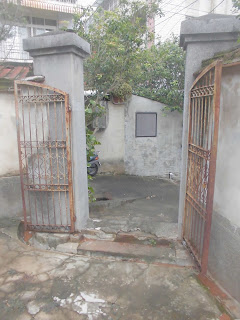繼續說新埔的話。下面是新埔的郵局。因為是假日所以沒有開。
Here are some more photos from Shinbu. First off, their very tiny, local post office. It's closed because it's a national holiday.
新埔鎮(シンポチン)の続き。最初は地元の小さな郵便局。祝日だから閉まっている。
進巷子去就碰到這棟廢墟的建築。I rode through some of the "back streets" behind the main street through town. There was this big, abandoned building...
裏道をちょっと走ってみたら、このでかい廃墟となった建物に遭遇した。
我喜歡台灣一般人的老房子。原因是因為平常沒有很浮華的裝飾,只有詳細的。比如說窗戶前的鐵棒有漂亮的模樣,還是牆壁有一點點雕刻。
And some other oldish-looking houses. I like a lot of the low-key designs that Taiwan's older houses use, such as intricate metalwork patterns on the things outside the windows (I don't know what to call them) and lines carved into the concrete walls. The houses are nothing special, but I like finding the little touches that people thought to put into them to make them just a little bit different.
この辺に昔ながらの民家がたくさんある。私はこういう家の細やかなデザインが好き。家自体がそんなすごいものでもないが、ちょっとした工夫で綺麗にしようとする努力があっちこっち見える。時々窓の外の鉄棒みたいなやつが綺麗に絡まっているところとか、外壁に線が刻まれているところとか。
我也碰到一座祠堂。上面被蓋了,看起來蠻舊。
There was a family shrine as well. It's been covered by scaffolding to protect it.
祖先の廟。天候から守る為に上に別のものが建てられている。
週邊的牆壁
The surrounding wall.
周りの塀。
我對台灣的宗教不熟,所以還是不懂祠堂的情況。因為祠堂是崇拜一個家族的祖先,所以蓋的是那些家人吧?應該祠堂算是他們的私物地吧?但是我碰到很多祠堂是開放的,什麼人都可以進去。(這裡也是這樣。)為什麼不關門?只是因為不擔心小偷而已嗎?(應該沒有東西值得偷。)然後,我知道有的祠堂也得到「文化資產」的地位。這些地方也還是算是私物地嗎?
Family shrines are built by well-off families who have the resources to devote an entire building to the worship of their ancestors. They look like normal, public temples, but there are some differences that I've learned over time. The columns typically lack all the dragons and tigers that you will see on the columns of a normal temple, and there won't be lion guardian statues at the entrance. (Though this is not one hundred percent guaranteed. I think you can find examples of ancestral temples that do have these features.) Also, in the center, instead of a statue of a god, there will be a bunch of tablets. These have the names of ancestors written on them.
I don't know much about Taiwanese religion to tell the truth, but I think that, since these places worship the ancestors of one specific family, they are typically constructed by that family, and are therefore private property and solely for that family's use. People outside that family wouldn't go here and worship because there aren't gods housed here, but the ancestors of one specific family. However, "family" here means "extended family", so realistically these temples are often used by a large number of people in the community because they're all related and share the same surname. Also, in some cases these temples have been designated as important cultural assets, and while they continue to be used for ancestor worship by the members of that family, they also seem to be generally open to the public. I don't know what the deal is with this one, but the gate was wide open, so I walked in.
こういう祖先の廟は(「祠堂」と書く)ある系統の人達が自分達の祖先を祀る為に建てる物だ。台湾の宗教があまりわからない私から見れば、一般の廟とこういう祠堂のどこが違うかよく分からなかったが、一般の神を祀る廟と違って、柱に龍とか虎などのデザインがないのが区別できるところだそうだ。また、真ん中に偶像がなくて、祖先の名前が書いている石碑みたいなものがある。
祠堂はある家系の人達が建てる物だから、一応私有物になると思う。でも台湾の田舎のところには、同じ名字の人達が同じ地域に集まっていることは昔珍しくなかったから、結果としてはこういう祠堂が地域の多くの人達が利用した廟となったパターンは結構あったと思う。現代はおそらく都市化のせいでこの傾向が少なくなりつつあるかもしれないが。でも私有物と言っても、こういう祠堂が一般公開していることも珍しくない。ここも門が開きっぱなしだったから、私は勝手に入って拝見した。
最初は「なんで蚊が勝つのか」と思ったけど、「蚊」でも、「勝」でもない。「蛟」は龍の種類、そして右側の字はもちろん「勝」じゃなくて、「騰」だから、龍が飛んでいくみたいな意味だろう。
有可能是多數登革熱的新聞害我看錯,我把這個字看成「蚊勝」。
離村鎮一點的地方碰到這座廟。風景不錯!
I drove out of town a bit and happened upon another temple in the hills. The view was gorgeous, but I don't think my camera quite captured it due to the low light caused by the cloudy weather.
町からちょっと離れたところで別の廟を見つけた、この山景色の写真が撮れた。
小小路邊的廟
A roadside shrine.
上記の廟に行く途中路側の廟も見かけた。
門也不錯但是我的目的是拍後面的建築。我想進右邊的巷子去看看,但是看到幾隻狗在那邊閒晃就捨棄了。我應該至於恐懼正程度怕狗。對我來說台灣到處眾多的流浪狗是一個很不如人意的事情。
The gate to yet another shrine in town. There were dogs wandering around down the alley where the be-raincoated person is walking, so I didn't go that way even though there was a building I wanted to check out. I'm really afraid of dogs, and Taiwan is unfortunately filled with strays and dogs that people just let wander around outside.
町に戻って廟の前にこの門と後ろの面白そうな建物の写真を撮った。本当は後ろの建物をもっと見たかったけど、カッパを着ている人が歩いている道に野良犬がいた。私はかなり恐犬症だから、無理を感じて諦めた。残念なことに、台湾には野良犬がめっちゃ多いから、私はしょっちゅう困っている。
也有很厲害的教會。
There was an impressive church in town too.
すごい教会もあった。
這座廟很簡樸。
Another shrine. I think. It's pretty bare-bones as far as religious buildings in Taiwan go.
一般より質素な廟。
剛好是柿子的果期。
This area is known for its persimmons, and they were in season when I visited.
この辺は柿が有名で、ちょうど旬だった。
在曬乾
Here they are being dried.
こういう風に柿を乾燥する。
這時候我已經決定快要回新竹市還車,所以我沒有把下面兩座的廟看清楚。只拍個格一張而已。
Two more temples I came across. I was getting ready to head back to Hsinchu City to return the bike and then head up to Taipei at this point, so I didn't really check them out much.
もうそろそろ帰ろうと思った時に下の二つの廟を見つけた。外の写真だけ撮っといた。
這個標誌太有趣我拍到了。曾經我有寫過台灣羅馬字的情況。簡單來說,很糟糕。(但也很有趣。我不希望會更新。)上面「六福村」變成「Leofoo」。這個選擇其實不錯。英文是母語的人應該看到這個拼音會正對地發音。可是還不按照規則的拼音法。中間的「小人國」」的中文和英文完全不一樣。為何發生這樣?然後下面有趣的不是翻譯。翻譯沒有問題。但是因為「Dong」聽起來是陰莖的措詞所以標誌好像告訴我們有一個「小雞雞科學主題樂園」。英文也用「ding dong」這個字來代表鈴的聲音。只是因為有時候「dong」是「陰莖」的意思,而在前面有「small」所以看起來這裡就是這個意思,,,
There are many interesting translation and transliteration choices here. "Leofoo" is not a bad choice for transliterating the name of the village if your target audience speaks English and understands that "oo" is pronounced like in "moon", but it's a very non-standard choice. The second place name is interesting too because in Chinese it's "Small Person Country" or "Nation of Dwarves" or something like that, but it's been turned into something totally different in English.
As for "Little Ding-Dong", well, that's actually an accurate translation of one of the names Doraemon goes by in the Chinese-speaking world. It just sounds really unfortunate in English.
突っ込むところが多い標識。まずは六福村の「Leofoo」が普通なローマ字のやり方じゃない。英語が母語の人はこれを見て多分発音がちゃんとできると思うから、納得できる綴り方だけど、とにかく変わっている。次は「小人国」がなぜか英語名が全然違う。そして三番目の「Little Ding-Dong」。これは普通に正しく訳されたが、面白いのはこれがドラえもんの中国語の名前の一つ。首に鈴をつけているから、鈴の音の擬声語の「ディンドン」になった。実は「多拉A夢」という名前もよく使われている。これは単に日本語の発音を当てているだけだ。この名前はよく工夫したと思う。ドラえもんはポケットからたくさん(「多」数)のものを取り出す(言い方変えたら:引っ張り出す、つまり「拉」)。そのものは「夢」みたいにすごいものばかり。きっとこういう意味を考えながら字を当てたと思う。証拠はないけど。
下次:海岸和燈塔!
Next time: Coastal Beauty and a Lighthouse!
次回:海岸の風光明媚と灯台に感動される!

































No comments:
Post a Comment